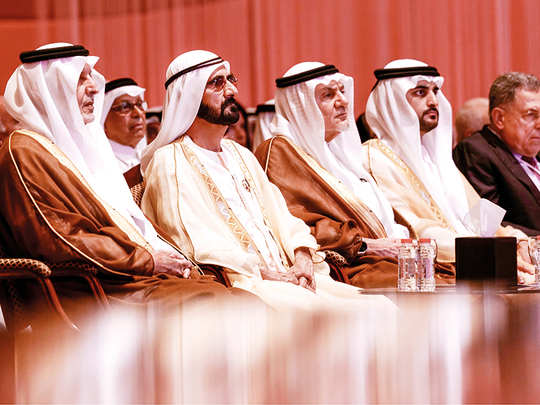
Dubai: The loss of jobs among blue-collar workers due to the fourth industrial revolution and lack of trust in institutions are among the greatest challenges facing the Arab world, a top Arab League official said on Tuesday.
Addressing delegates on the second day of the annual FIKR 16 Conference, Ahmad Abul Gheit, secretary-general of the Arab League, highlighted the challenges facing the Arab world and what can be done to defeat these challenges amid regional turmoil.
In his keynote address, Gheit said in the age of fourth industrial revolution, Arabs and Arab youth should utilise the outcome of this revolution for a brighter future.
“We are in the age of a huge industrial revolution that will change rules of politics, economics and societies, but with every revolution comes winners and losers and among the victims are those non-specialised workers who will lose their jobs,” Gheit said.
He referred to migration of Arab youth to western countries where they have low-paid jobs. “Where are we as Arabs in the wake of this industrial revolution, should we miss it as we missed the first one and become victims of backwardness and colonisation or should we able to break that vicious circle by utilising its outcome and making it the greatest priority in our societies?”
The UAE is a bright example all countries should follow, he said while addressing His Highness Shaikh Mohammad Bin Rashid Al Maktoum, Vice-President and Prime Minister of the UAE and Ruler of Dubai, who attended the opening of the conference.
Fake news and misuse of personal data have led to a lack of trust in political, religious, social and cultural institutions, he said.
“In the West and Arab world, many elections were as a result of such misuse of social media and it did not contribute to reinforcing democracy but to lies and chaos in which we need to address,” he said.
“We have to learn how to coexist; otherwise, countries will seize to exist and collapse,” he said.
“We are trying to lay foundations for stabilisation and empower institutions to deal with threats … Even religious institutions need to open up and not be isolated from societies and learn lessons from other institutions around them.
“Chaos and turmoil don’t bring anything good to societies but reform brings changes societies need and call for. Reforms of cultural and educational systems is the right remedy. We need reforms in order to maintain stability and deal with chaos.”
Meanwhile, Dr Henri El Awit, director-general of the Arab Thought Foundation, organisers of the event, said the four-day FIKR conference comes at a critical period facing the region and elite Arab thinkers attending this edition will use scientific analysis and explore objective approaches to deal with challenges.
“We have to take responsibility of stabilisation and we have to contribute from our own positions and Arab world at large to establish the state of law and order and reform the political systems.”
The application of good governance countering corruption, elimination of poverty and unemployment, and fair distribution of wealth, including the modernisation of education and methods of teaching to stop the growing phenomena of violence and extremism are among topics to be discussed.
Prince Khalid Al Faisal, Adviser to Saudi king, Governor of Makkah Region and the chairman of the Arab Thought Foundation, was present at the conference titled ‘Stabilisation Challenges Amidst Regional Turmoil’, along with other senior officials.
The conference, which started on Monday, will conclude on Thursday.











